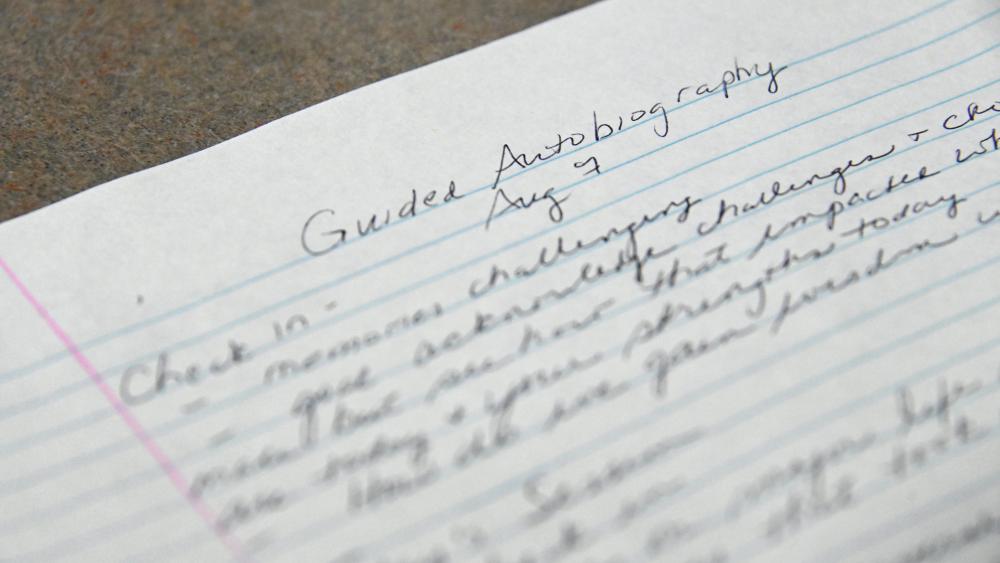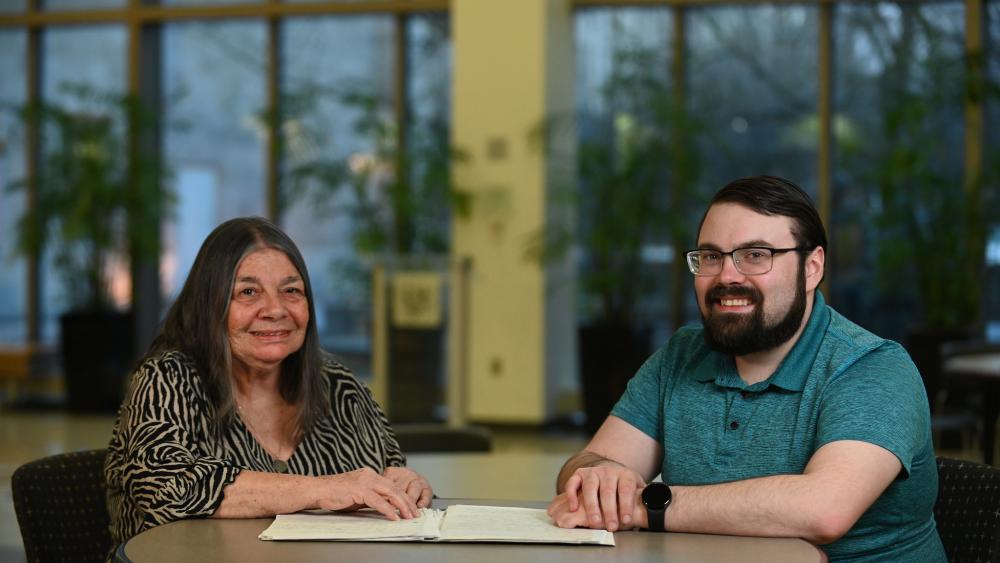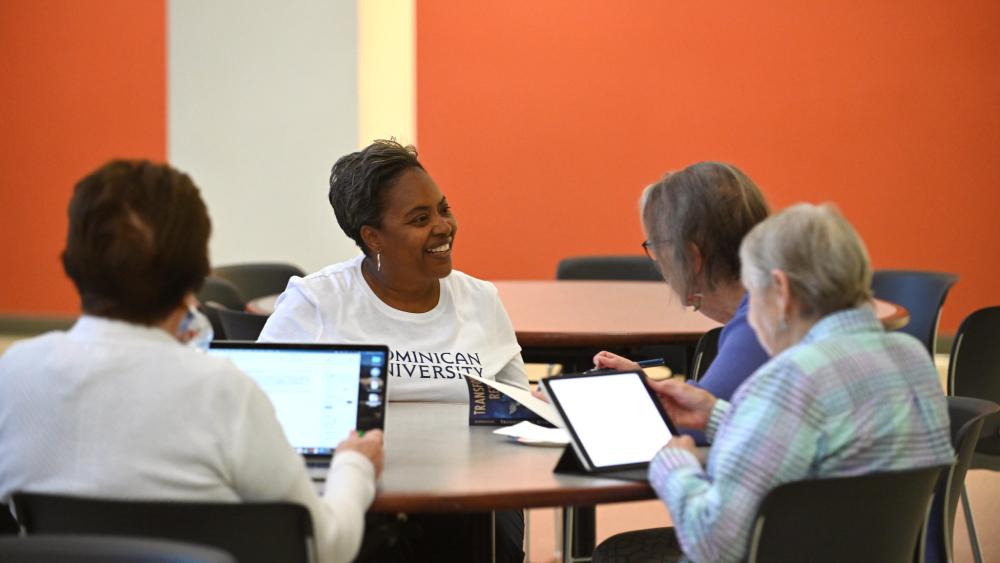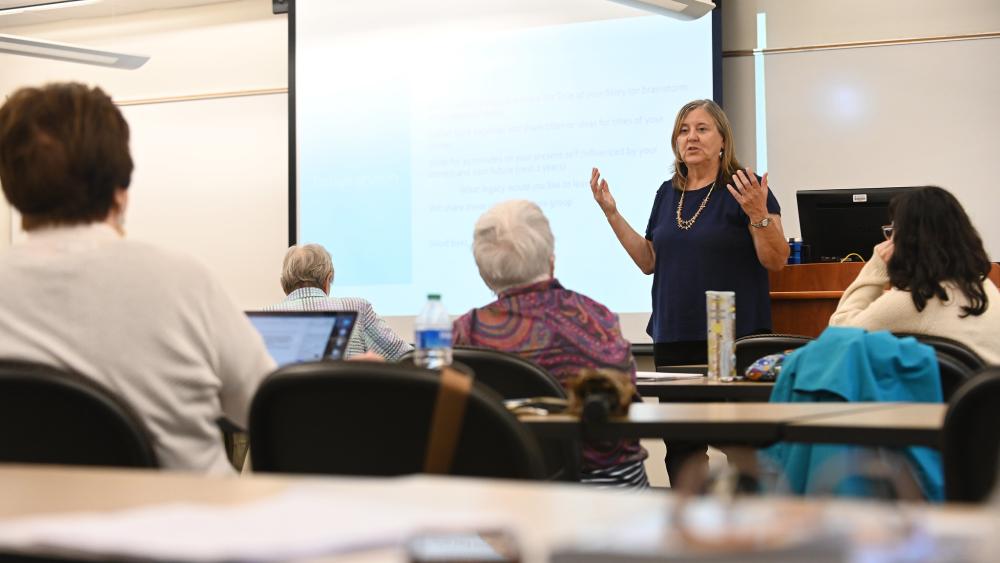Intergenerational Connection

Future Social Workers Gain New Perspectives by Helping Older Adults Share Their Life Stories
Everyone has a life story to leave behind.
The key is getting it down on paper.
Last summer, a class project gave graduate-level students in the School of Social Work the chance to help members of the River Forest-Oak Park community find their stories—all while establishing an intergenerational connection.
The School of Social Work offers an academic track in aging, adulthood and gerontology. Tying into this, the Successful Aging: Communities of Care and Intergenerational Experience course, led by Dr. Julie Bach, associate professor of social work, included a four-week guided autobiography session in which five social work students helped volunteers over age 65 write stories from their lives.
“Once your loved ones are no longer with you, those stories get lost. And we want people to tell their own stories,” said Bach, who specializes in gerontology, the study of aging.
Students used the book Telling the Stories of Life Through Guided Autobiography Groups as their manual, encouraging their elder partners to reflect on several important life topics, such as professional or life accomplishments, work experiences, families or meaningful relationships.
By guiding these individuals in the writing of their autobiographies, students gain insight into the diversity of life experiences among older adults while challenging their perceptions, Bach explained.
“A lot of health care professionals have very minimal experience working with older adults, or they view older adults as frail,” she said. “This population is actually very vibrant, so this course gives students a positive view of the later years. The hope is, for some students, they will be more willing to consider working with older adults in their future years as a social worker.”
And that’s important, as the population continues to age. According to a recent U.S. Census report, by 2034, the number of adults over 65 will outnumber children for the first time in U.S. history.
The guided autobiography project has its roots at the Sinsinawa Mound. Pre-pandemic, students would travel to the Mound for interactions and interviews with the Sinsinawa Dominican Sisters.
Last summer was the first time that guided autobiography occurred with volunteers from the local community.
Sandra Sokol, of Oak Park, was one of those volunteers. The former Oak Park village clerk and teacher admitted that writing about herself was, at first, challenging, but the guidance and direction that Bach provided made the process easier.
“She wanted us to think deeply into whatever we wrote about, not just say, ‘I was born on this day and this happened,’” Sokol explained. “She didn’t want a biographical account. She gave us poignant questions to think about and delve into the ‘why.’”
Sokol wrote about growing up in the South Bronx neighborhood in New York City. She wrote of various family members, the jobs they had, and tidbits about their lives. The experience sparked an interest in writing more about her maternal grandmother, who left Europe at the age of 13, accepted an arranged marriage, and stepped in to help her daughter’s household when Sokol’s father was drafted to serve in World War II. Sokol noted how she and her grandmother shared a special bond and closeness.
Student Christian Meyer partnered with Sokol in the class. Both felt comfortable working together, they said.
“Sandra and the other member of our group shared lots about their lives and that was an important part of it,” Meyer said, adding that they were receptive to feedback as well.
“The most positive thing about the class was working with the students and hoping we are helping them,” Sokol said.
While the class itself also focused on different long-term care options and services for older adults, the guided autobiography portion served as a great way to understand their different life experiences, Meyer acknowledged. It also aided in relationship formation.
“No matter the work we’re doing—whether it’s writing someone’s life story or doing therapy or connecting people with resources—relationships are at the core,” he said. “We have to have that connection with people and build it in a way that is meaningful.”
Jessica Mercer MSW ’23 participated in the course and now works with older adults in post-hospitalization care coordination.
During a discussion of the guided autobiography project at Dominican’s Caritas Veritas Symposium last September, Mercer noted that it can be easy for younger adults to look at older adults as “other” if they lack interaction with this population. The course, she said, gave her a new perspective.
“I got to meet people who had life experiences that were a world away from anything I grew up with,” she said.
While the project was not meant to be part of therapy, it can be used in that way, Bach said. Working with older adults can also help students themselves become more informed of their own aging, she said. Bach’s hope is that intergenerational learning in the classroom can be greatly enhanced at Dominican University. Making new connections with older adults through special events and activities could be a start, she suggested.
“What would it be like to walk into a class and have people between the ages of 18 and 90 in your class?” Bach asked. “How would that change what the class is like? I think it would really enrich it.”


